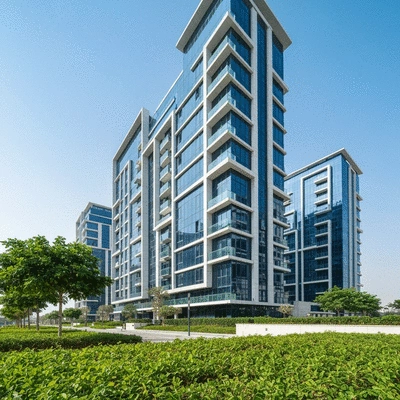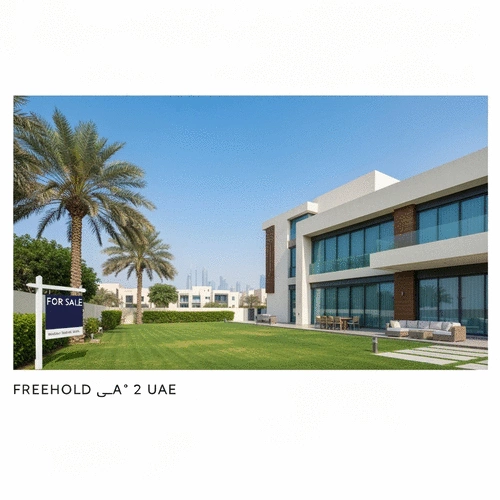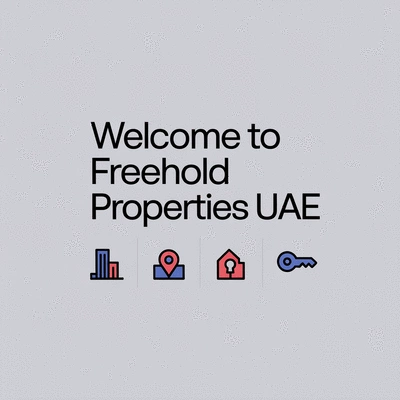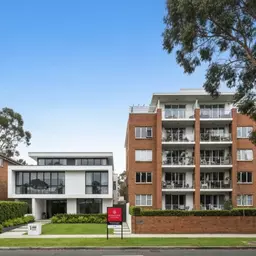As a foreign investor in the UAE, understanding freehold property ownership can transform your investment journey. With the right knowledge, you can unlock the full potential of your property. Here’s what you’ll learn about navigating this dynamic market.
What You Will Learn
- Freehold properties offer complete ownership, allowing you to control your property and the land it occupies indefinitely.
- Understanding the differences between freehold, leasehold, and usufruct rights is crucial for making informed investment decisions.
- Foreign buyers can purchase freehold properties in designated areas, but it's essential to be aware of local laws and regulations.
- Effective property management is key after purchase, including maintenance, tenant relations, and legal compliance.
- Resale potential and inheritance planning are important considerations for safeguarding your investment's future.
- Awareness of homeowners' associations (HOAs) and their regulations can significantly impact property value and living conditions.
- Different emirates have unique regulations for freehold ownership, making it vital to research before investing.
- Understanding tax implications, including VAT and capital gains, is essential for financial planning.
- Being aware of market risks, including fluctuations and maintenance costs, helps in making informed investment choices.
Comparative Overview of UAE Property Ownership Types and Regulations
Understanding the distinctions between freehold, leasehold, and usufruct rights, as well as the varying regulations across emirates, is crucial for successful property investment in the UAE.
Understanding Freehold Property Ownership in the UAE
Are you considering investing in real estate in the UAE? Understanding freehold property ownership is essential for both local and international buyers. Freehold properties offer complete ownership of the property and the land it stands on, providing a sense of security and long-term investment potential. This unique ownership structure is attractive to many, making it an excellent option for anyone looking to settle in this dynamic region!
Choosing freehold over other types of property ownership allows for greater flexibility and freedom. Imagine having the ability to renovate, rent, or sell your property without restrictions! In the UAE, freehold properties can be found in various emirates, each offering distinct lifestyles and opportunities for investment. Now, let's dive into what freehold property really means.

What is Freehold Property and Why Choose It?
Freehold property is a type of real estate ownership where the owner holds the title to the property and the land it occupies indefinitely. This means you can fully control your investment, whether you're planning to live in it or rent it out. Choosing freehold property has several benefits, which include:
- Complete ownership and control over the property
- The ability to sell, rent, or modify the property without restrictions
- Potential for capital appreciation in a growing market
With the UAE's robust real estate market, investing in freehold properties can also yield significant returns over time. The freedom associated with freehold ownership means you can truly create a space that's uniquely yours!
Key Differences: Freehold vs. Leasehold and Usufruct Rights
It's crucial to understand the differences between freehold, leasehold, and usufruct rights when exploring property options in the UAE. Here’s a quick comparison:
- Freehold: Full ownership of the property and land.
- Leasehold: Ownership for a specific period (usually up to 99 years) with the land belonging to another entity.
- Usufruct: Right to use and benefit from a property owned by another party for a specified period.
Understanding these distinctions can help you make informed choices about your investment. At Freehold Properties UAE, we guide you through these intricacies, ensuring you choose the right type of ownership that aligns with your goals!
Overview of Freehold Laws in the UAE: What Foreign Investors Should Know
The UAE has established clear laws governing freehold property ownership, particularly for foreign investors. It’s vital to be aware of these regulations to navigate the market successfully. Here are some essential points to keep in mind:
- Foreigners can purchase freehold properties in designated areas across the UAE. For instance, the Dubai Land Department provides comprehensive information on real estate ownership, including provisions for foreign investors.
- Property ownership rights are protected under UAE law, providing security for your investment. The 2023 Investment Climate Statements for the UAE further highlight the legal protections in place for investors.
- It is advisable to consult legal experts to understand specific regulations related to foreign ownership. For example, Abu Dhabi also has specific guidelines; you can find more details on property ownership for foreigners in Abu Dhabi through official sources.
Being informed about these laws can significantly impact your investment experience. As a seasoned real estate expert, I’m here to provide insights and assist you in navigating the complexities of freehold property ownership in the UAE. Let’s take the first step toward securing your dream property!
I couldn't find a specific YouTube video titled "Complete Guide to Buying Freehold Properties in the UAE for 2025." However, I can suggest a video that provides comprehensive information on Dubai real estate, which includes insights into freehold properties.Here's an embed code for a video titled "Dubai Real Estate Market 2025: Step-by-Step Buying Guide," which covers aspects relevant to buying properties in Dubai:Pro Tip
Did you know? When investing in freehold properties in the UAE, always conduct thorough research on the specific emirate's regulations and market trends. Understanding regional differences can help you make a more informed decision and maximize your investment potential!
Frequently Asked Questions (FAQs)
What is freehold property ownership in the UAE?
Freehold property ownership grants complete, indefinite ownership of both the property and the land it occupies to the owner. This allows for full control over the asset, including the ability to sell, rent, or modify it without restrictions.
What are the main differences between freehold, leasehold, and usufruct rights?
Freehold offers full ownership indefinitely. Leasehold grants ownership for a specific period (e.g., up to 99 years), where the land is owned by another entity. Usufruct provides the right to use and benefit from a property for a specified period, but the property itself is owned by another party.
Can foreigners own freehold properties in the UAE?
Yes, foreigners can purchase freehold properties in designated areas across the UAE. These ownership rights are protected under UAE law, though specific regulations may vary by emirate.
What post-purchase considerations are important for foreign investors?
Key post-purchase considerations include effective property management (maintenance, tenant relations, legal compliance), resale planning (staying informed on market trends), and inheritance planning (ensuring proper legal documentation). Understanding Homeowners' Associations (HOAs) and their regulations is also crucial.
Are there tax implications for foreign buyers in the UAE?
While most residential properties are exempt from VAT, commercial properties may be subject to it. It's also important to understand potential capital gains taxes on property sales. Consulting a tax expert familiar with UAE laws is highly recommended to clarify your obligations based on your tax residency status.
Post-Purchase Considerations: Managing Your Investment
Congratulations on your new property! Now that you've made one of the most significant investments of your life, it's time to consider what comes next. Managing your investment efficiently is crucial to ensure that it remains a valuable asset. At Freehold Properties UAE, I'm here to guide you through the essential post-purchase considerations that every foreign owner should keep in mind.
From property management to resale strategies, understanding these elements will help you maintain and even enhance the value of your property over time. Let's dive into the key aspects that will keep your investment thriving!
Property Management: What to Expect After Buying
Once you’ve secured your freehold property, effective property management becomes essential. Depending on your personal situation and whether you plan to rent out your property, you might want to consider hiring a property management company. Here’s what to expect:
- Maintenance and Repairs: Regular upkeep is necessary to keep your property in excellent condition.
- Tenant Management: If you’re renting, handling tenant relations can be time-consuming. A management company can handle inquiries, payments, and conflict resolution.
- Legal Compliance: Staying compliant with local laws and regulations is crucial, especially as a foreign investor.
Choosing a professional property management service can save you time and stress, allowing you to enjoy your investment without the everyday hassles.

Resale and Inheritance Planning for Foreign Owners
Thinking ahead is vital for any property owner. As a foreign buyer, it's important to consider both resale potential and inheritance planning. Here are some things to keep in mind:
- Market Trends: Stay informed about the current market to time your resale effectively.
- Legal Documentation: Ensure all your documentation is in order for a smooth sale or inheritance transfer.
- Consult Professionals: Working with real estate experts can provide insights into the best strategies for resale and inheritance.
Taking these steps will help safeguard your investment, ensuring it can be easily passed on or sold when the time comes.
Understanding Homeowners' Associations and Community Development
In many freehold properties, especially in planned communities, you’ll encounter Homeowners' Associations (HOAs). Understanding their role is essential for maintaining your property’s value. Here's what you should know:
- Rules and Regulations: HOAs often have specific guidelines that must be adhered to, which can include landscaping, renovations, and even rental policies.
- Fees: Be prepared for regular HOA fees that fund community services and maintenance.
- Community Development: HOAs play a significant role in community development and maintaining property values, so staying engaged can help you influence local decisions.
Understanding the nuances of your HOA can significantly enhance your living experience and protect your investment.
Filling the Gaps: Unique Insights and Recommendations
As you continue your property ownership journey, it’s essential to fill any gaps in your knowledge regarding the investment landscape in the UAE. With my experience at Freehold Properties UAE, I’ve gathered unique insights that will be beneficial for you.
Let’s break down some of these critical areas!
Comparative Analysis of Freehold Regulations Across Emirates
The UAE is comprised of various emirates, each with its own set of regulations regarding freehold property ownership. Understanding these differences can be key to navigating your investment successfully. Here are some examples:
- Dubai: Offers a robust legal framework for foreign investors, making it a popular choice.
- Abu Dhabi: Has specific zones where freehold ownership is permitted, often requiring additional paperwork.
- Sharjah: Generally restricts foreign ownership, thus requiring careful consideration when investing.
Being aware of these regulations can save you from potential pitfalls and enhance your investment strategy.
Tax Implications for Foreign Buyers: Understanding VAT and Capital Gains
Taxes can significantly impact the profitability of your investment. As a foreign buyer, it’s essential to understand the implications of VAT and potential capital gains taxes:
- Value Added Tax (VAT): While most residential properties are exempt from VAT, commercial properties may not be.
- Capital Gains Tax: Understanding how this tax affects profits from property sales is crucial for financial planning.
- Tax Residency: Your tax residency status can influence your obligations, so consult a tax expert familiar with UAE laws.
Maintaining clarity on these tax implications can help you manage costs and maximize returns on your investment.
Investment Risks and Returns in the UAE Real Estate Market
Every investment comes with risks, and the UAE real estate market is no exception. As you consider your options, here are a few risks to watch out for:
- Market Fluctuations: Economic conditions can impact property values, so stay informed about market trends.
- Regulatory Changes: Keep an eye on changes in laws that could affect ownership or rental rights.
- Maintenance Costs: Unexpected repairs can eat into your profits, so budget accordingly.
By understanding these risks, you can make more informed decisions and navigate your investment more effectively.
Recap of Key Points
Here is a quick recap of the important points discussed in the article:
- Freehold properties offer complete ownership of both the property and the land, providing long-term investment security.
- Choosing freehold over leasehold or usufruct rights allows for greater flexibility in property use and management.
- Foreign investors can purchase freehold properties in designated areas, with ownership rights protected under UAE law.
- Effective property management is crucial for maintaining asset value, including maintenance, tenant management, and legal compliance.
- Understanding local market trends, legal documentation, and consulting professionals are critical for successful resale and inheritance planning.
- Being aware of homeowners' association rules and community regulations can enhance your living experience and investment protection.
- Stay informed about tax implications and market fluctuations to manage risks and maximize returns in the UAE real estate market.










